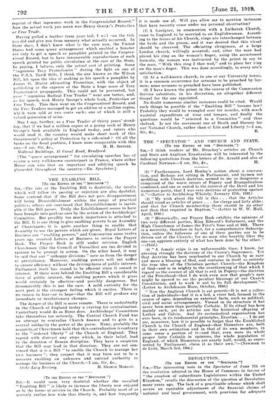THE ENABLING BILL.
ITo THE EDITOR OF TEE " SPECTATOR.") SIR,—The fate of the Enabling Bill is doubtful; the results which will follow its passing or rejection are also doubtful. Some contend that if the Bill does not pass disappointment will bring Disestablishnient within the range of practical politics; others are convinced that Disestablishment is inevit- able if the Bill passes. Truly the Establishment seems to have been brought into parlous case by the action of the Archbishops' Committee. But possibly too much importance is attached to the Bill. It is one thing to give enabling powers to an Assembly of Churchmen; it is quite another thing to enable that Assembly to use the powers which are given. Royal Letters of Business are "enabling powers," and Convocation some twelve years ago received Letters of Business to revise the Prayer Book. The Prayer Book is still under revision. English Churchmen (like the Council of Versailles) are too divided in opinion to be prompt in action. On the other hand, it may be said that our " unhappy divisions " save us from the danger of precipitancy. Moreover, enabling powers will not suffice to ensure efficiency without the driving-force of public interest. Parliament itself has ceased to be efficient since it ceased to interest. If there were behind the Enabling Bill a considerable force of public interest, the enabling powers which it gives would certainly be effective—and possibly dangerous. But demonstrably this is not the case. A mild curiosity for the most part is the strongest feeling which it excites. There is no reason to fear—or to hope—that the Bill will produce any immediate or revolutionary changes.
The danger of the Bill is more remote. There is undoubtedly in the Church of England to-day a craving for centralization. Canterbury would do as Rome does. Archbishops' Committees take themselves too seriously. The Central Church Fund was an attempt to centralize Church finance and to give to a central authority the power of the purse. Many, probably the majority,of Churchmen hold that this centralization is contrary to the "ordered liberty " of the Church of England. They regard with distrust any steps which, in their belief, lead in the direction of Roman discipline. They have a suspicion that the Bill may lead in that direction. They are not Con- vinced that it is a Bill " to enable the Church to manage her own business "; they suspect that it may turn out to be a measure enabling an unknown aed untried authority to manage the business of the Church.—I am, Sir, &c.,






































 Previous page
Previous page